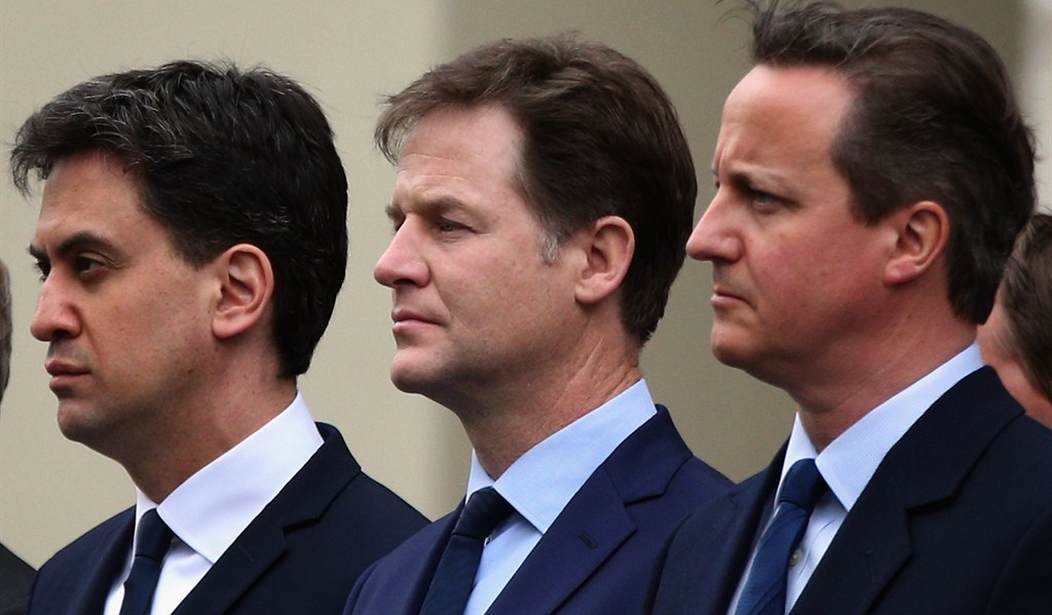Advertisement
Former Liberal Democrat Party leader Paddy Ashdown was so certain the exit polls were wrong that he announced on the BBC he would publicly eat his hat if they were right. British chefs may now be considering whether a traditional bowler or a Carnaby Snap Brim from Christys’ would make the most palatable meal.
When the actual results were in -- a Conservative sweep, with the exception of Scotland -- the experts were even more gobsmacked. How could this have happened? They had predicted an outcome too close to call, a hung Parliament and the possibility that Labour Leader Ed Miliband, who ran a campaign attacking "the rich" and promised higher taxes, was poised to become the next prime minister.
The Telegraph said Labour lost because "it chose the wrong leader, wrong team and wrong priorities." Miliband, along with Nick Clegg, leader of the Liberal Democrats, and UKIP's Nigel Farage, resigned within minutes of each other in a scene reminiscent of the Watergate era's "Saturday Night Massacre." With few opposition leaders -- save the Scottish National Party's (SNP) Nicola Sturgeon -- Cameron has been given a honeymoon period to enact his agenda that could last up to a year.
Cameron also promised to devolve powers across Britain in an effort to stave off increasingly nationalism in Scotland and Wales and calls for independence from England. This is a practice conservatives in America would like to see implemented between Washington and the states. Among Cameron's priorities should be the repeal of the Human Rights Act, which has been used by terrorists and criminals in Britain to avoid prison and deportation, and to curb immigration which, as in America, has become an uncontrolled flood.
Recommended
Advertisement
Conservatives win -- in Britain and the U.S. -- when they articulate and stick to their principles and show they stand more for average people than for the rich. Cameron took language straight from Labour's playbook when he spoke of supporting "working people."
Two former top aides to President Obama advised Miliband (David Axelrod) and Cameron (Jim Messina), proving that at least in Messina's case, a big paycheck trumps liberal ideology. The British press reported Axelrod made $300,000 GBP (about $460,000 USD) for his failed efforts. No word on how much Messina was paid, but he apparently rationalized his work for Cameron because the prime minister supports same-sex marriage and believes in "climate change." Not all conservatives fit a single mold.
In remarks delivered the morning after Election Day, Cameron reiterated his successful campaign themes: "Our manifesto is a manifesto for working people and as a majority government we will be able to deliver all of it: indeed, it is the reason why I think majority government is more accountable. Three million apprenticeships, more help with childcare, helping 30 million people cope with the cost of living by cutting their taxes building homes that people are able to buy and own, creating millions more jobs that give people the chance of a better future and yes, we will deliver that in-out referendum on our future in Europe."
That last one will be tricky because of trade, jobs and other issues tied to Britain's relationship with the European Union, as well as its increasingly fragile ties to Scotland. Last year the Scots rejected an independence referendum, but having swept 56 of 59 seats in the new Parliament, the SNP can cause problems for Cameron's agenda, which its star leader, Nicola Sturgeon, vowed to do during the campaign.
Advertisement
In the last days before the election and in response to criticism he was too laid-back, Cameron managed to get fired-up. He cast aside traditional British reserve, speaking with force and conviction. American conservatives take note.
"I feared the worst ... thank God for the good sense of the British people," wrote Max Hastings in The Daily Mail. Even in a mostly secular nation like Britain, that seems a good sentiment considering the "miraculous" results.

























Join the conversation as a VIP Member